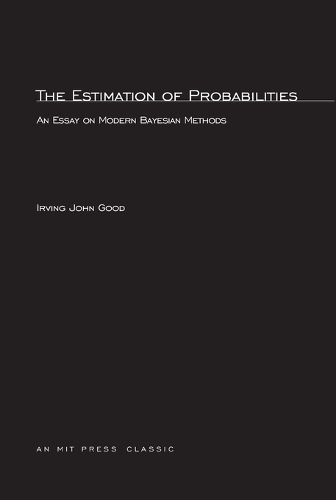
The Estimation Of Probabilities: An Essay on Modern Bayesian Methods
(Paperback)
Publishing Details
The Estimation Of Probabilities: An Essay on Modern Bayesian Methods
By (Author) Irving John Good
MIT Press Ltd
MIT Press
17th March 2003
United States
Classifications
Professional and Scholarly
Non Fiction
Physical Properties
Paperback
109
Width 137mm, Height 203mm
327g
Description
The problem of how to estimate probabilities has interested philosophers, statisticians, actuaries, and mathematicians for a long time. It is currently of interest for automatic recognition, medical diagnosis, and artificial intelligence in general. This monograph reviews existing methods, including those that are new or have not been written up in a connected manner.The problem of how to estimate probabilities has interested philosophers, statisticians, actuaries, and mathematicians for a long time. It is currently of interest for automatic recognition, medical diagnosis, and artificial intelligence in general. The main purpose of this monograph is to review existing methods, especially those that are new or have not been written about in an organized way. The need for nontrivial theory arises because our samples are usually too small for us to rely exclusively on the frequency definition of probability. Most of the techniques described in this book depend on a modern Bayesian approach. The maximum-entropy principle, also relevant to this discussion, is used in the last chapter. It is hoped that the book will stimulate further work in a field whose importance will increasingly be recognized. Methods for estimating probabilities are related to another part of statistics, namely, significance testing, and example of this relationship are also presented. Many readers will be persuaded by this work that it is necessary to make use of a theory of subjective probability in order to estimate physical probabilities and also that a useful idea is that of a hierarchy of three types of probability which can sometimes be identified with physical, logical, and subjective probabilities.
Author Bio
Irving Good was University Distinguished Professor of Statistics at Virginia Polytechnic Institute and State University as well as an adjunct professor of the Center for the Study of Science in Society and an adjunct professor of Philosophy.
